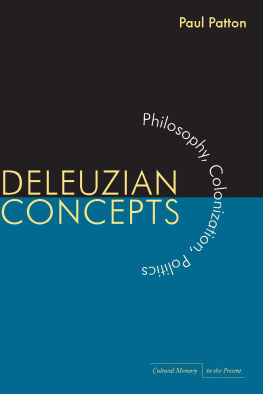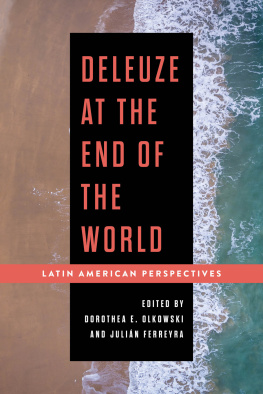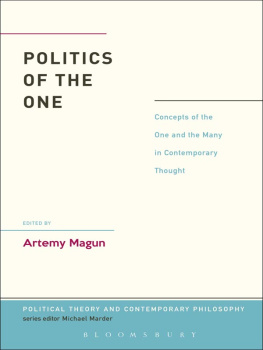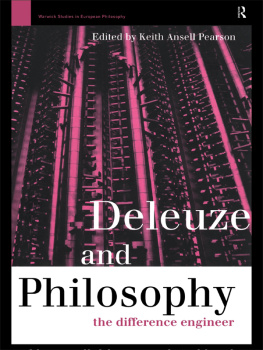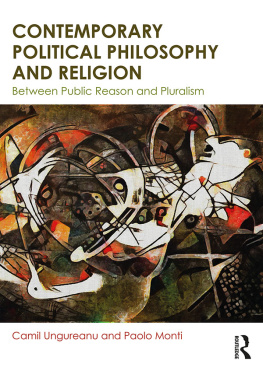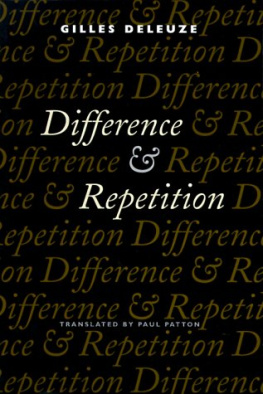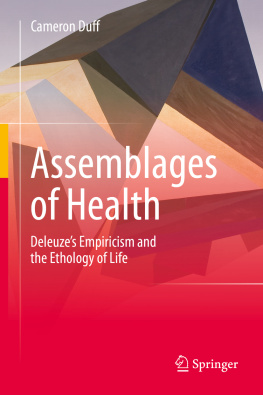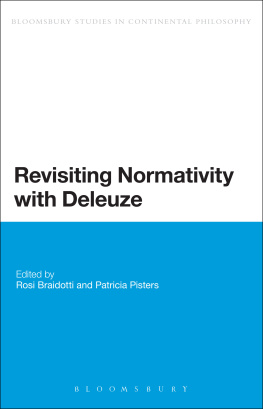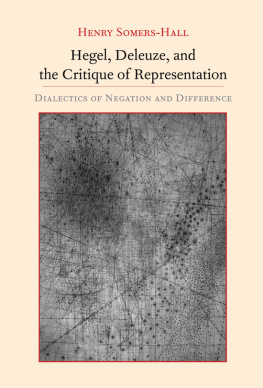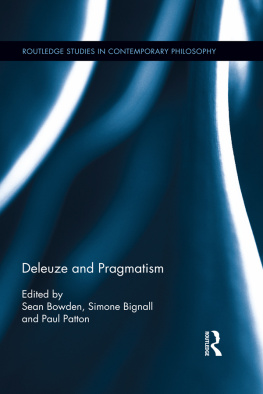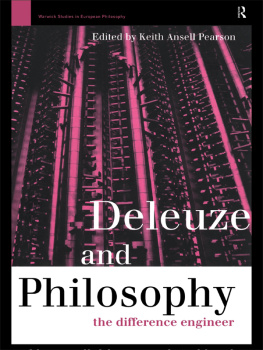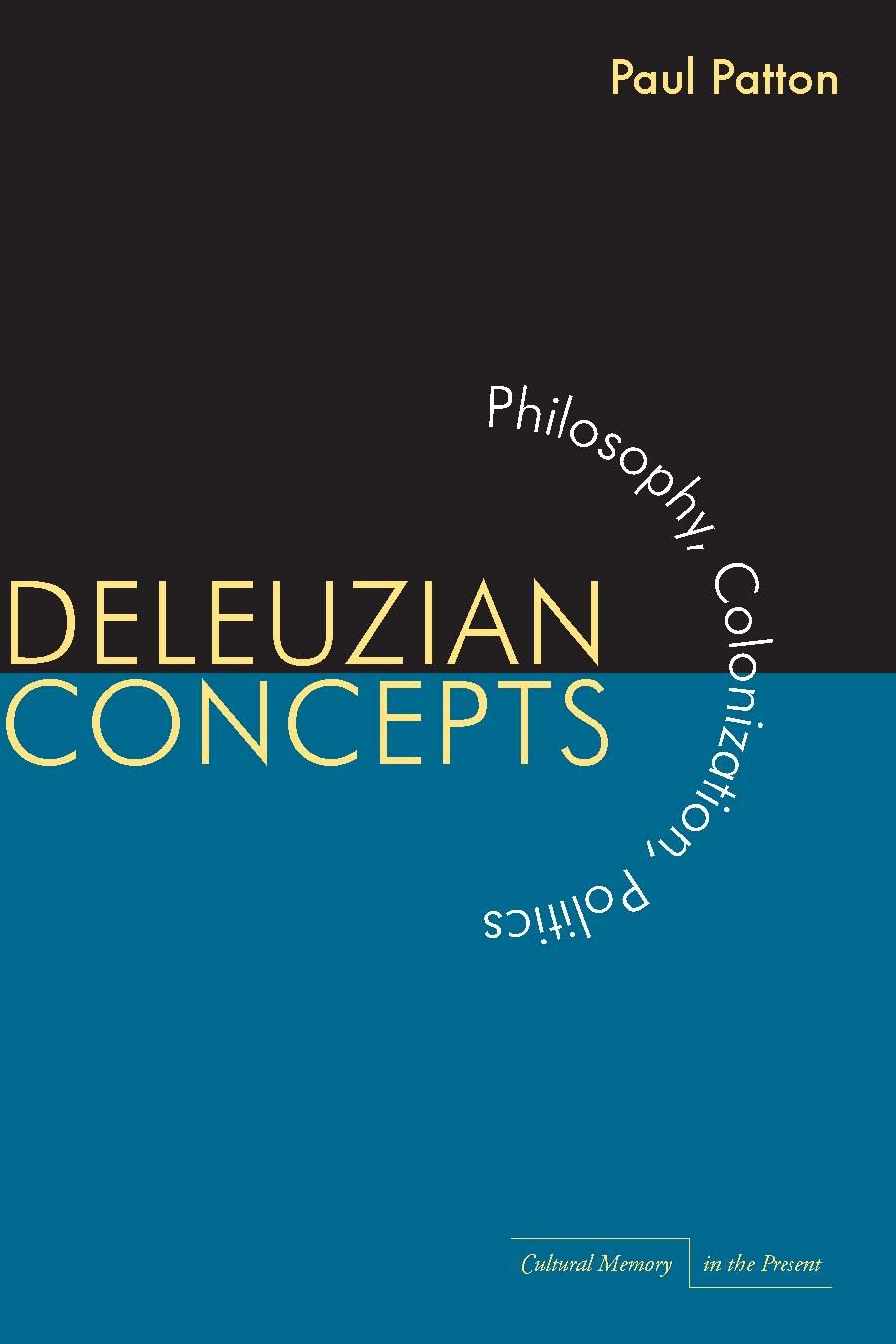Acknowledgments
This book draws on essays previously published, although not always in the form in which they appear here. I am grateful to the publishers for permission to reprint material from the following articles and chapters:
Mobile Concepts, Metaphor and The Problem of Referentiality in Deleuze and Guattari, in Maria Margaroni and Effie Yiannopoulou, eds., Metaphoricity and the Politics of Mobility. Amsterdam and New York: Rodopi, 2006, 2746. With the permission of Editions Rodopi.
Future Politics, in Paul Patton and John Protevi, eds., Between Deleuze and Derrida. London and New York: Continuum, 2003, 1529. By kind permission of Continuum Publishing.
Concept and Politics in Derrida and Deleuze. Critical Horizons, 4:2, October 2003, 157175. With permission of Brill Publishing.
Redescriptive Philosophy: Deleuze and Guattaris Critical Pragmatism, in Patricia Pisters, ed., Micropolitics of Media Culture: Reading the Rhizomes of Deleuze and Guattari, 2942. Amsterdam: Amsterdam University Press, 2001. Extracts reproduced with permission of Amsterdam University Press.
Events, Becoming, and History, in Jeffrey Bell and Claire Colebrook, eds., Deleuze and History , 3353. Edinburgh, UK: Edinburgh University Press, 2009. Reproduced with the permission of Edinburgh University Press.
The Event of Colonisation, in Ian Buchanan and Adrian Parr, eds., Deleuze and the Contemporary World, 195220. Edinburgh, UK: Edinburgh University Press, 2006. Reproduced with the permission of Edinburgh University Press.
Becoming-Animal and Pure Life in Coetzees Disgrace . ARIEL: a review of international english literature , Special Issue: Law, Literature, Postcoloniality, 35:12 Spring 2006, 101119. Reproduced with the permission of the Board of Governors, University of Calgary, AB.
Deleuzes Practical Philosophy, in Symposium: Canadian Journal of Continental Philosophy, 10:1, Spring 2006, 285303. Extracts reproduced with the permission of the editor.
Deleuze and Democracy. Contemporary Political Theory , 4:4, December 2005, 400413. Reproduced with the Permission of Palgrave Macmillan.
Deleuze and Democratic Politics, in Lars Tnder and Lasse Thomassen, eds., Radical Democracy: Politics between Abundance and Lack , 5067. Manchester, UK, and New York: Manchester University Press, 2005. Extracts reproduced with the permission of Manchester University Press.
Becoming-democratic, in Ian Buchanan and Nicholas Thoburn, eds., Deleuze and Politics , 178195. Edinburgh, UK: Edinburgh University Press, 2008. Extracts reproduced with the permission of Edinburgh University Press.
Order, Exteriority and Flat Multiplicities in the Social, in Martin Fuglsang and Bent Meier Sorensen, eds., Deleuze and the Social , 2138. Edinburgh, UK: Edinburgh University Press, 2006. Extracts reproduced with the permission of Edinburgh University Press.
Utopian Political Philosophy: Deleuze and Rawls . Deleuze Studies, 1:1, 2007, 4159. Extracts reproduced with the permission of Edinburgh University Press.
I am grateful to Hent de Vries for encouraging me to submit my book to this series. Many people have commented on earlier versions of the essays collected here, some in response to papers presented at conferences and seminars and some in response to written drafts. Among those who have provided me with helpful feedback and suggestions I would especially like to thank: Manola Antonioli, Miriam Bankovsky, Jane Bennett, Constantin Boundas, Sean Bowden, Rosi Braidotti, Ian Buchanan, Claire Colebrook, William Connolly, Simon Critchley, Chris Danta, Rosalyn Diprose, Simon Duffy, Bela Egyed, Martin Fuglsang, Moira Gatens, Gary Genosko, Eugene Holland, Duncan Ivison, Anthony Laden, Gregg Lambert, Craig Lundy, Catherine Malabou, Maria Margaroni, Paola Marrati, Todd May, Philippe Mengue, Dirk Moses, Adrian Parr, Patricia Pisters, John Protevi, Marc Rlli, Linnell Secomb, Daniel W. Smith, Bent Meier Sorensen, Charles J. Stivale, Kenneth J. Surin, Nicholas Thoburn, Lasse Thomassen, Lars Tnder, Simon Tormey, James Williams, and Effie Yiannopoulou.
Research for this book was supported under Australian Research Councils Discovery Projects funding scheme DP0772933.
Reference Matter
Notes
INTRODUCTION
For example, see Belaval 1974, 1061; Descombes 1980, 136167; Salanskis 2005, 1920; Worms 2009, 482-489.
See also Derridas comments about Deleuze in his interview with Richard Kearney (Derrida 1999) and his comments in The Transcendental Stupidity ( Btise ) of Man and the Becoming-Animal according to Gilles Deleuze (Derrida 2007b).
Among recent comparative discussions of Deleuze and Derrida, see Baross 2000, Baugh 2000, Bearn 2000, Goodchild 2000, Lambert 2000 and 2003, Lawlor 2000 and 2003, Patton and Protevi 2003, Barton 2003, Kuiken 2005, Nancy 2005, and Boundas 2005 and 2006.
See the essays in Bignall and Patton (2010). Rda Bensmaa in particular asks how it is that Deleuze influenced so many postcolonial authors despite his relative lack of engagement with postcolonial literature and theory (Bensmaa 2010, 119122).
On jurisprudence, see P 209210, 230, 153; 169170 and his remarks in LAbcdaire, G comme Gauche . On the philosophical function of shame, see QP 103, 108 and P 231, 172. On becoming-revolutionary see P 231, 171 and D 176, 147. On becoming-democratic, see QP 108, 113. On societies of control, see Postscript on Societies of Control, P 240247, 177182.
On societies of control, see Hardt 1998a,b; Hardt and Negri 2000, 325350; Surin 2006 and 2007. On law, see Lefebvre 2005, 2006, 2008; along with the papers in the International journal for the Semiotics of Law , 20 (1), March 2007, 1106, and Braidotti, Colebrook, and Hanafin (2009). See also Sutter (2009).
Zourabichvilis Le vocabulaire de Deleuze begins with the suggestion that We do not yet know Deleuzes thought, in part through lack of attention to the rigor of his concepts (Zourabichvili 2003, 3).
LAbcdaire de Gilles Deleuze avec Claire Parnet is unpublished in literary form but available on videocassette (1996) and DVD (2004) from Video Editions Montparnasse. I am grateful to Charles J. Stivale for his help in transcribing and translating the remarks cited throughout.
On Lacan, see Slavoj Zizek, Organs without Bodies (Zizek 2004); Dan Smith, The Inverse Side of the Structure: iek on Deleuze on Lacan (Smith 2004); and Gregg Lambert 2006, 67101. On Spinoza, see Thomas Nail, Expression, Immanence and Constructivism: Spinozism and Gilles Deleuze (Nail 2008). On Nietzsche, see Craig Lundy, Deleuzes Untimely: Uses and Abuses in the Appropriation of Nietzsche (Lundy 2009).
CHAPTER 1
See also N. Katherine Hayles: Deleuze and Guattari use metaphors indispensable to their argument and treat them as if they were literally true (Hayles 2001, 156).
This remark does not imply opposition to rights in general but only to a way of understanding these that refers back to an already determined and static set of human rights. His comments on jurisprudence in discussion with Parnet in LAbcdaire (Deleuze 1996) and Negri (Control and Becoming in Deleuze 1995, 169176) make it clear that he prefers a conception of rights as in perpetual transformation in accordance with the requirements of a particular situation (see the discussion of these remarks in Chapter 8, below, pp. 172173).
This eulogy was first published as Il me faudra errer tout seul, Libration, 7 November 1995. Available at www.liberation.fr/culture/0101158943-il-me-faudra-errer-tout-seul

